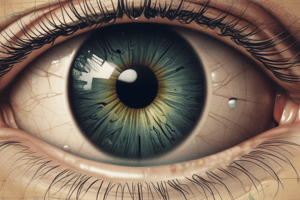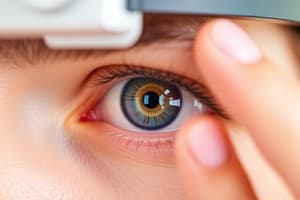Podcast
Questions and Answers
What is the kinesthetic sense responsible for?
What is the kinesthetic sense responsible for?
- Recognizing the size, shape, and texture of an object
- Storing and discharging meaningful stimuli
- Interpreting sensory nerve impulses
- Enabling awareness of the position and movement of body parts (correct)
In normal sensation, what is perception related to?
In normal sensation, what is perception related to?
- Recognition of the size, shape, and texture of an object
- Selective storage or discharge of stimuli
- Integration and interpretation of stimuli (correct)
- Stimulation of sensory nerve fibers
What does a deficit in sensory reception and perception result in?
What does a deficit in sensory reception and perception result in?
- Enhanced sensory acuity
- Sensory deficit (correct)
- Sensory overload
- Increased socialization with others
When visual or hearing acuity changes or declines, what may a person do to cope with the sensory loss?
When visual or hearing acuity changes or declines, what may a person do to cope with the sensory loss?
What does sensory reception involve?
What does sensory reception involve?
What is pain considered in relation to sensation?
What is pain considered in relation to sensation?
What is the first sign of macular degeneration?
What is the first sign of macular degeneration?
Which disorder is characterized by numbness and tingling of the affected area and stumbling gait?
Which disorder is characterized by numbness and tingling of the affected area and stumbling gait?
What is the result of a stroke affecting the left hemisphere of the brain?
What is the result of a stroke affecting the left hemisphere of the brain?
Which factor leads to thicker mucus and a dry mouth, interfering with the ability to eat?
Which factor leads to thicker mucus and a dry mouth, interfering with the ability to eat?
What is the cause of balance deficit resulting in dizziness and disequilibrium?
What is the cause of balance deficit resulting in dizziness and disequilibrium?
What decreases visual/motor coordination and leads to reduced color perception?
What decreases visual/motor coordination and leads to reduced color perception?
What is the reticular activating system responsible for?
What is the reticular activating system responsible for?
What is a common symptom of sensory overload?
What is a common symptom of sensory overload?
What is presbyopia?
What is presbyopia?
What do patients with sensory deficits often do in adaptive ways?
What do patients with sensory deficits often do in adaptive ways?
What is the most common problem associated with computer vision syndrome?
What is the most common problem associated with computer vision syndrome?
What is a characteristic of glaucoma?
What is a characteristic of glaucoma?
What is expressive aphasia?
What is expressive aphasia?
How do patients with visual impairments detect the emotional tone of communication?
How do patients with visual impairments detect the emotional tone of communication?
What is the primary sense for people with hearing impairments?
What is the primary sense for people with hearing impairments?
What is global aphasia?
What is global aphasia?
What is a common alternate way of communicating for patients who have undergone laryngectomies?
What is a common alternate way of communicating for patients who have undergone laryngectomies?
What should be assessed regarding the use of assistive devices for patients with sensory alterations?
What should be assessed regarding the use of assistive devices for patients with sensory alterations?
What is a common sign of visual alteration in adults?
What is a common sign of visual alteration in adults?
Which assessment activity is relevant for assessing a patient's hearing acuity?
Which assessment activity is relevant for assessing a patient's hearing acuity?
What behavior indicates a hearing deficit in adults?
What behavior indicates a hearing deficit in adults?
What is a predisposing factor for vision/hearing injury that should be assessed in patients?
What is a predisposing factor for vision/hearing injury that should be assessed in patients?
What is an assessment activity relevant for assessing a patient's vision?
What is an assessment activity relevant for assessing a patient's vision?
What is a common symptom of hearing alterations that should be asked to the patient?
What is a common symptom of hearing alterations that should be asked to the patient?
What is the recommended communication method for patients with aphasia?
What is the recommended communication method for patients with aphasia?
How should communication be carried out with patients having an artificial airway?
How should communication be carried out with patients having an artificial airway?
What should be done to communicate effectively with patients with hearing impairment?
What should be done to communicate effectively with patients with hearing impairment?
How is sensory loss addressed in the implementation stage for acute care?
How is sensory loss addressed in the implementation stage for acute care?
What is recommended to promote normal sensory reception in restorative and continuing care?
What is recommended to promote normal sensory reception in restorative and continuing care?
What is advised if learning has not taken place during patient evaluation?
What is advised if learning has not taken place during patient evaluation?
What is recommended when communicating with a patient who has problems speaking?
What is recommended when communicating with a patient who has problems speaking?
How should patients with hearing impairment be approached in terms of communication?
How should patients with hearing impairment be approached in terms of communication?
What should be avoided when speaking with someone who is deaf?
What should be avoided when speaking with someone who is deaf?
How should sensory abilities be evaluated in terms of improvement?
How should sensory abilities be evaluated in terms of improvement?
Flashcards are hidden until you start studying
Study Notes
Sensation and Perception
- Kinesthetic sense is responsible for sensing body position and movement.
- Perception is related to the interpretation of sensory information.
Sensory Deficits
- A deficit in sensory reception and perception results in sensory loss or impairment.
- When visual or hearing acuity changes or declines, a person may cope with the sensory loss by using assistive devices or adapting to new ways of communication.
Sensory Reception
- Sensory reception involves the detection and transmission of sensory information to the brain.
Pain and Sensation
- Pain is considered a type of sensation.
Visual Impairments
- The first sign of macular degeneration is often blurred vision.
- Presbyopia is a age-related decline in near vision.
Balance and Dizziness
- A balance deficit resulting in dizziness and disequilibrium can be caused by a problem with the inner ear or the balance centers in the brain.
Sensory Overload
- A common symptom of sensory overload is anxiety or agitation.
Brain and Sensation
- A stroke affecting the left hemisphere of the brain can result in difficulty with language and communication.
- The reticular activating system is responsible for regulating arousal and alertness.
Adaptive Behaviors
- Patients with sensory deficits often adapt to their impairments by using alternative ways of communicating or sensing the environment.
Communication and Sensory Impairments
- Patients with visual impairments may detect the emotional tone of communication through nonverbal cues.
- The primary sense for people with hearing impairments is often vision.
- Expressive aphasia is a language disorder characterized by difficulty with speaking and expressing thoughts.
Glaucoma and Vision
- Glaucoma is a characteristic of increased pressure in the eye that can lead to vision loss.
Computer Vision Syndrome
- The most common problem associated with computer vision syndrome is dry eye.
Assessment and Intervention
- When assessing a patient's hearing acuity, whispering a word or phrase from behind the patient can be an effective way to evaluate their ability to hear.
- A common sign of visual alteration in adults is difficulty with reading or watching TV.
- Patients with hearing impairments may indicate a hearing deficit by cupping their hand around their ear or asking for repetition.
- A predisposing factor for vision/hearing injury that should be assessed in patients is exposure to loud noises or hazardous chemicals.
Effective Communication
- The recommended communication method for patients with aphasia is to use simple, clear language and to avoid frequent interruptions.
- When communicating with patients having an artificial airway, it is recommended to use nonverbal cues and to avoid speaking loudly.
- To communicate effectively with patients with hearing impairment, it is recommended to face them directly, speak clearly, and use visual aids.
- In the implementation stage for acute care, sensory loss is addressed by adapting to the patient's sensory abilities and using assistive devices.
- To promote normal sensory reception in restorative and continuing care, it is recommended to provide opportunities for sensory stimulation and to encourage patient participation.
- If learning has not taken place during patient evaluation, it is recommended to re-evaluate the patient's sensory abilities and adapt the teaching approach accordingly.
- When communicating with a patient who has problems speaking, it is recommended to use alternative methods such as writing or gestures.
- Patients with hearing impairment should be approached in terms of communication by using clear, simple language and avoiding loud noises.
- When speaking with someone who is deaf, it should be avoided to speak loudly or to use complex language.
Studying That Suits You
Use AI to generate personalized quizzes and flashcards to suit your learning preferences.




